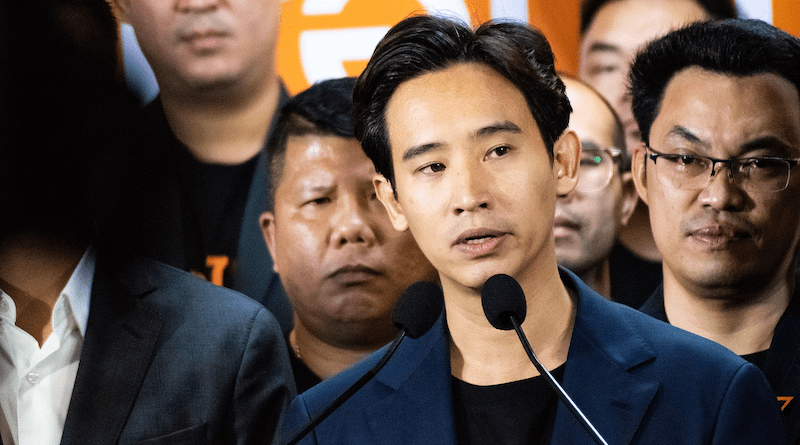Thailand: Insurmountable Challenges Ahead For A New Government – Analysis
One week after the May 14 election, the members of the Prayut-Chan-O-Cha government are carrying on business, as if nothing happened. The young Move Forward Party (MFP) leader Pita Limjaroenrat is trying to assemble a coalition and support from the senate that will give him the 376 votes necessary to elect him prime minister.
In Thailand, the PM is not the person who commands the majority of seats in the lower house. The vote for prime minister is undertaken from a bicameral vote of both the lower house and 250 member senate. Currently Pita has support from 314 MPs designate in the 500 member lower house. That means Pita will have to win over 64 senators from the military appointed senate to acquire enough votes to become Thailand’s next prime minister. The only other alternative is for Pita to gain the support of Anutin Charnvirakul’s Bhumjaithai Party, and retain Anutin as a deputy prime minister. This is something MFP supporters and Pheu Thai wouldn’t accept.
The probability of gaining the support of 64 senators would be an unprecedented shift in support away from the establishment and military towards the people. One might even include royalty. Any senator who voted for a prime ministerial candidate with the abolishment of Section 112 on the government platform, would face consequences.
Under such circumstances, the present government combining Bhumjaithai Party (70), Palang Pracharath Party (40), United Thai Nation Party (25), Democrat Party (25), and the Charttaipattana Party (10), have 181 seats and with the support of the senate, would have 431 votes for their prime ministerial candidate. There is a possibility that Anutin, who has very close ties with the royal family, military, and the elite business families in Thailand, may rise as a potential compromise candidate.
That’s the mathematics the general election and current constitutional framework provides for the selection of Thailand’s next prime minister.
Pita and his MFP topped the opinion polls before the election. This was a shock to the establishment, where there was a general consensus, they would be dealing with Pheu Thai. However, Pheu Thai lost a lot of urban support to MFB, and became the second in the seat tally.
The pro-US, China suspicious stance of the MFB would mean a major shift in foreign policy for the Thai government. Not many within the establishment want to change the status quo on this issue.
The Thai establishment was caught off guard with the overwhelming support the radical young party obtained in the election and had expected the Thaksin supported Pheu Thai to finish on top. There are rumours the former prime minister Thaksin Shinawatra, in self-exile, after being ousted in the military coup in 2014, while he was out of the country at the United Nations in New York, had done a number of deals with Prayut, the military, and even the king. The offer of ‘B’ class ministries to Pheu Thai, which include commerce, transport, agriculture, digital economy and society, tourism, and industry, are not inspiring.
Pheu Thai also has a separate stance on the Section 112 amendment, declaring it would leave it intact, is reassuring to the establishment. Thus, there are rumour of talks that Pheu Thai may be trying to forge another coalition with the parties included in the out-going government to form a coalition. This however, would be totally unacceptable to the remnants of the ‘red shirts’, who suffered so much during the crack downs, immediately following the 2014 coup. Many ‘red shirts’ also lost their lives in the Bangkok streets under the Democrat government led by Abhisit Vejjajiva in 2010.
The biggest threat is yet to play out
A member of the pro-military Palang Pracharath Party has lodged a complaint against Pita, that he breached the electoral law by holding shares in a media company, iTV which ceased operations in 2006. The EC has not yet decided whether to refer the matter to the Constitutional Court. Section 98 of the Thai Constitution disallows MPs to hold equity in the media. Although, Pita claims his shareholding is held in estate from his late father. Any court verdict on the matter is unpredictable.
This move has the same hallmarks of the case against the Former Move Forward Party, where the then leader Thanathorn Juangroongruangkit was disqualifies as an MP in 2019, after the general election results.
Pita has been weeklong holding press conferences, media interview both domestic and abroad, and framing up the signing of a coalition MOU, scheduled for May 22, to enhance his legitimacy as the natural prime ministerial candidate. However, this may be premature, as ‘democracy’ Thai style, is much more complex and intriguing than just winning a simple election. These appearances may have shown up his and MFP’s inexperience, as Pita has unintentionally painted himself as a target. The handful of senators who came out in support of voting for Pita will be dealt with to ensure the senate remains solidly behind the establishment.
There are two other games in town, other than Pita’s quest for the prime ministership. This may not be the watershed election many are claiming that will change the trajectory of Thai politics. More likely this will be the lowering of the Thai silk curtain to protect the establishment.
It will take two months for the Electoral Commission to certify the results. A lot can happen in politics over two months. Meantime the Prayut government still occupies Government House in the centre of Bangkok, and the moving trucks are no where to be seen.

